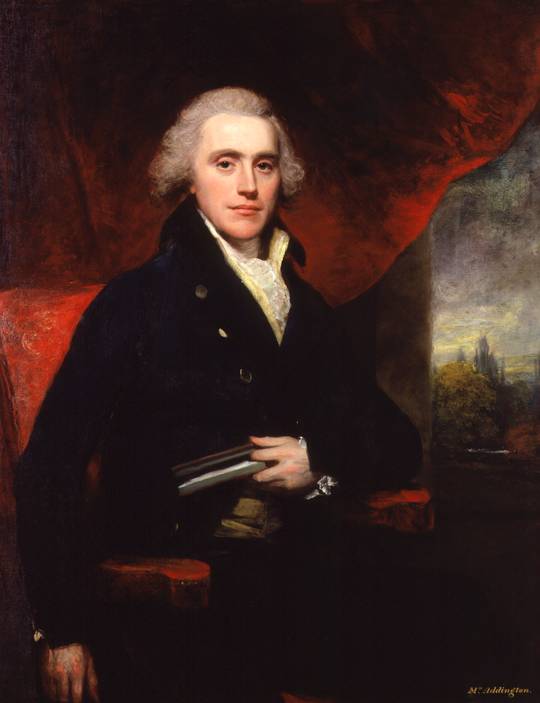Henry Addington (1757-1844) First Viscount Sidmouth from 1805. Home Secretary, 1812-22. Minister without Portfolio, 1822-24. Speaker of the House of Commons, 1789-1801. Prime Minister and Chancellor of the Exchequer, 1801-4. Lord President of the Council, 1805, 1806-7 and 1812. Lord Privy Seal, 1806. The son of the Pitt family’s physician, he was educated at Winchester and Brasenose College, Oxford and called to the Bar at Lincoln’s Inn. A mild-mannered supporter of Pitt, who nominated him for Speaker in 1789, he held that office with considerable distinction for eleven years, after which as an opponent of Catholic Emancipation whom Pitt liked and few objected to, he became Prime Minister, albeit reluctantly.
Although a mediocre debater, Addington, as a much-liked former Speaker, had the support of the country gentlemen and was not wholly ineffective in the House. Indeed, he was a more successful prime minister than the Victorians, Canning (or, indeed, Pitt, who accused him of ‘errors in finance’) admitted, being a good administrator with achievements, such as making Pitt’s income tax work properly, to his credit. Nevertheless, when the war resumed in 1803, Pitt’s return became inevitable. His return to Pitt’s Cabinet in 1805 was unfortunate, and his departure from the government over the Melville impeachment removed Pitt’s majority. His sojourn with the Talents was not a happy one, since politically he was to the ‘right’ of most former Pittites, and it was only a matter of time before Perceval cajoled him back into his Tory government in 1812.
Liverpool cemented the relationship by making Sidmouth Home Secretary and giving more jobs to his connections, including the Chancellorship to Vansittart. With the two men personally simpatico, Liverpool’s government was more solidly buttressed against assaults from Canning, Wellesley and the Whigs than Perceval’s had been for most of its tenure. Sidmouth was a strong, effective and hard-working Home Secretary during some difficult years, introducing coercive legislation in 1817 and the Six Acts in 1819. As a result of this he became unpopular, such that his retirement from the Home Office in 1822 together with Canning’s advent gave Liverpool’s government a new lease of life.
Mrs Arbuthnot did not have much time for Sidmouth, ranking him with Goderich among prime ministers unfit for the job, but George IV had a high regard for him, as had his father and referred to his proposed retirement in 1821 as ‘most painful’1.
[1] Aspinall, A. (ed.), The Letters of King George IV, 1812-30, vol. 3 p96 Letter from George IV to Liverpool, 30 November, 1824.
